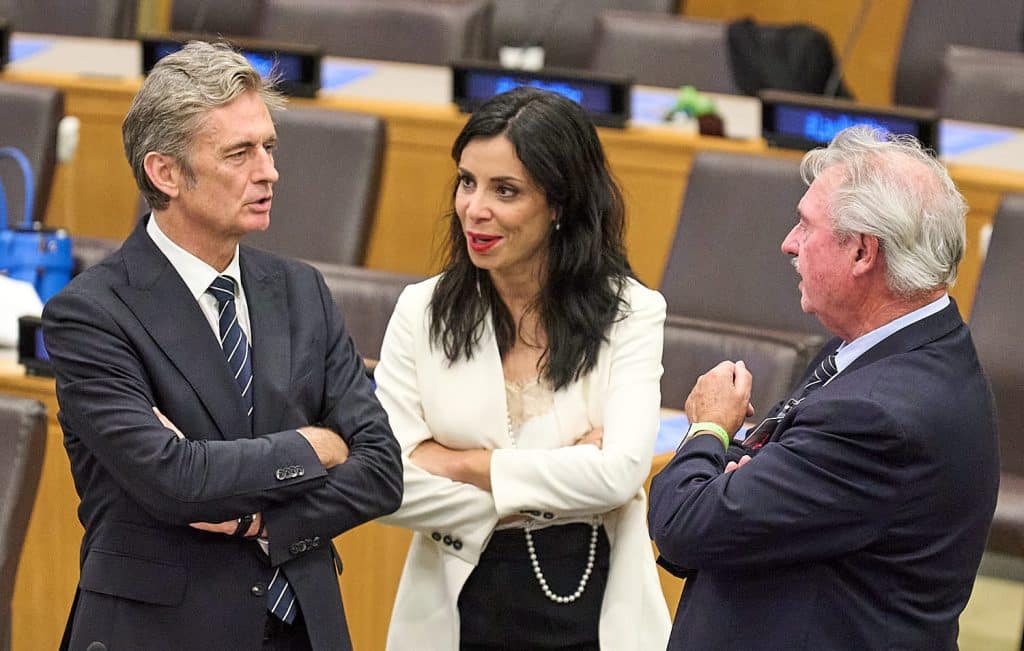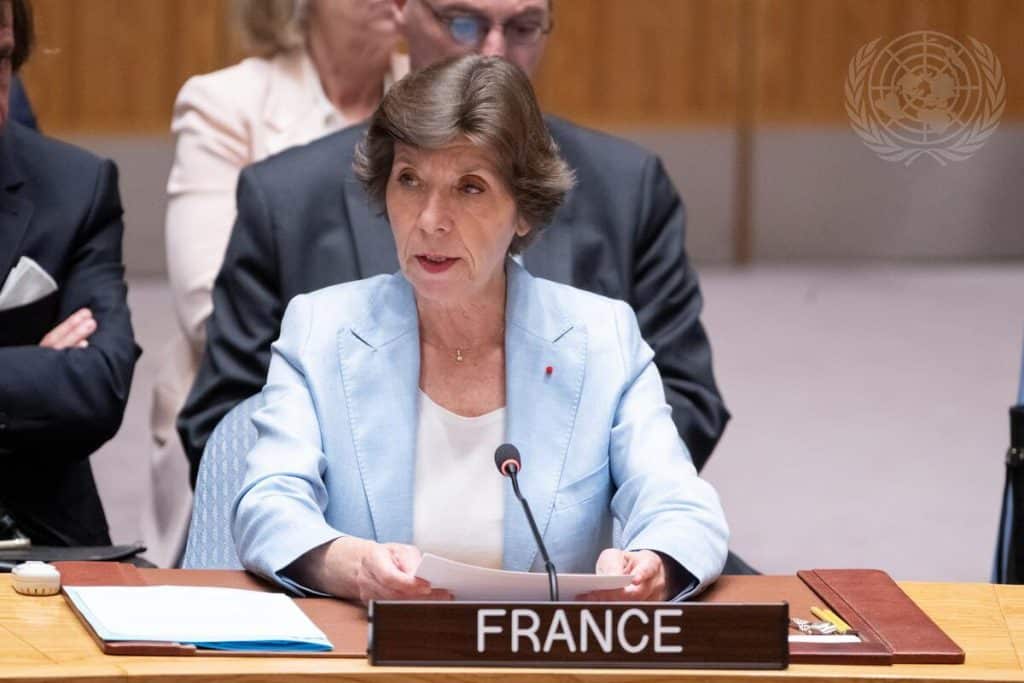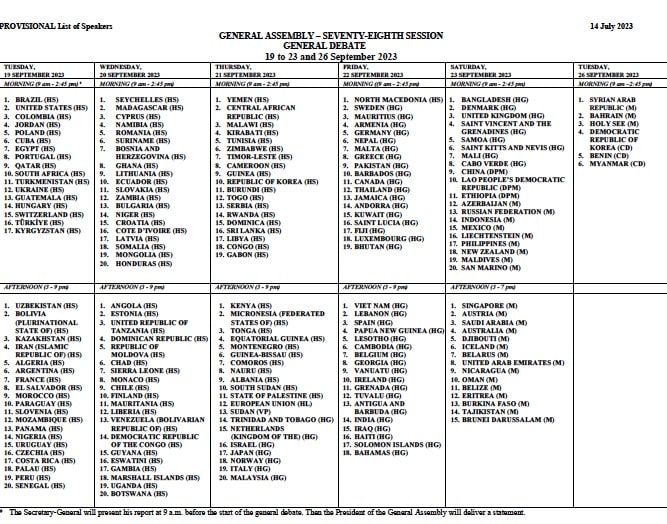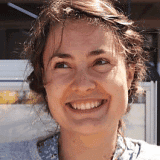
Like every week, we take you behind the scenes of the UN. This week, we focus mainly on the collapse of the Black Sea grain deal and its repercussions.
You are reading This Week @UN, summarizing the most pressing issues before the organization. The information is gathered from UN press briefings, PassBlue reporting and other sources. We look at the first-ever Security Council briefing on the opportunities and risks of AI for international peace and security (see Tuesday) and cover the distressing humanitarian crisis in Sudan (see Friday). You are receiving the summary on Sunday morning, as we published a breaking-news story on Saturday.
Some good news first. The July Blue Smoke newsletter is here (see Tuesday). Produced with the United Nations Association-UK, Blue Smoke spotlights senior appointments and important elections in the UN system. Make sure you don’t miss the latest monthly issue by subscribing to PassBlue right here.
With your support, PassBlue is promoting a midsummer fund-raising drive to reach $5,000. The goal is to not only keep producing the investigative journalism that is essential to holding powerful nations and people to account but also to strengthen our resources to cover the UN General Assembly’s biggest forum of the year, come early September. We are a small, dedicated team that has been producing ground-breaking news for 11 years. We encourage you, our loyal readers, to make your tax-exempt donation today.
• Delegations from across the globe marked the 25th anniversary at the UN of the adoption of the Rome Statute of the International Criminal Court. “By creating the International Criminal Court, the international community made a commitment, victims shall receive justice, perpetrators shall be held accountable and where the most severe international crimes are committed, the international community will not look the other way,” said Annalena Baerbock, Germany’s foreign minister, in her remarks at the July 17 commemoration. The treaty establishing the ICC, the world’s first permanent international court, was adopted on July 17, 1998, in Rome. Currently, only 123 countries have ratified the treaty. In his remarks, Jean Asselborn, Luxembourg’s foreign minister, called on those countries who have not ratified the statute to do so to “strengthen” the international rule of law, especially for smaller states. (The United States, Russia and China, three of the five permanent members of the Security Council, have not done so.)
At a separate commemoration event on Monday — against the backdrop of Ukraine’s nearly yearlong effort to create a special tribunal to prosecute the top troika of Russia’s leadership (the president, prime minister and foreign minister) — attendees at the UN marked the fifth anniversary of the activation of the ICC’s jurisdiction over the crime of aggression. Considered a leadership crime by the international justice community, the crime is recognized as making all others — war crimes, crimes against humanity and genocide — possible. The ICC has limited jurisdiction for the crime of aggression as it applies only to states parties to the ICC. As a result of Russia, the US and Ukraine not being parties to the court, as PassBlue has reported, the work to create a special tribunal to prosecute Russian leaders for the crime of aggression has opened a deep divide between the Group of 7 countries who support an internationalized/national tribunal rooted in Ukraine’s legal system and their European allies who advocate for a court to be established through the UN General Assembly. The stalemate was on full display at Monday’s forum. Baerbock, in her remarks, referred to the creation of a tribunal through the General Assembly as “charming” but said it “wouldn’t fly in reality.” In his response, Liechtenstein’s Ambassador Christian Wenaweser stressed that creating a tribunal through the UN to prosecute the crime of aggression is not only crucial for Ukraine but also “is really important for the international legal order.” Additionally, Latvia’s former President Egils Levits called the inability to prosecute the Russian leadership for the crime a “judicial, political and moral scandal.” He said a tribunal endorsed by the General Assembly to hold Russia’s highest officials accountable for their war in Ukraine as the “best solution.” Beth Van Schaack, the US ambassador-at-large for global criminal justice, attended the event but did not give remarks. Discussions on what shape the final tribunal will take are continuing. — DAWN CLANCY
This AM at the UN – Packed house as member states gather to commemorate the 25th anniv of the adoption of the Rome Statute of the @IntlCrimCourt @ItalyUN_NY @CanadaUN @LiechtensteinUN @pass_blue #crimeofaggression #warcrimes #atrocitycrimes #CrimesAgainstHumanity pic.twitter.com/2gZLiAUUOC
— Dawn Clancy (@dawnmclancy) July 17, 2023
Monday, July 17
• Russia Terminates the Black Sea Grain Deal. Ukraine Attempts a Plan B.: After Russia’s refusal to extend the Black Sea grain deal, Dulcie Leimbach examines how that decision affects all the parties involved and the wider ramifications. “The deal has been lambasted by Russia from the start for its one-sided shipments of most of Ukraine’s grain exports to well-off countries, which the UN has refuted with its own data, reiterating that secondary sales were not tracked by the organization, so grain purchases could have landed in other countries eventually,” Leimbach writes. She also points out possible alternatives to the deal, including one pushed by President Volodymyr Zelensky of Ukraine, who tweeted: “I have sent official letters to President of Türkiye @RTErdogan and UN Secretary General @antonioguterres with a proposal to continue the Black Sea Grain Initiative or its analog in a trilateral format — as it is best. Ukraine, the UN and Türkiye can jointly ensure the operation of the food corridor and the inspection of vessels.” [UPDATE: See Friday]
You might be interested in these posts.
• Spokesperson’s briefing: UN Deputy Secretary-General Amina Mohammed was in N’djamena, Chad, with the Cindy McCain, executive director of the World Food Program (WFP), and other UN officials, where they met with the country’s transitional president, Mahamat Idriss Déby Itno. They discussed how the UN system can increase its response to and galvanize more support from the world for “the humanitarian crisis in the eastern part of the country and advance longer-term development initiatives, in the context of the political transition,” said Stéphane Dujarric, UN spokesperson. A recent OCHA report says eastern Chad is “suffering from food and non-food shortages following the closure of the border with Sudan.” The WFP needs $157 million to help people in Chad amid the deteriorating situation, it said, adding that two million refugees and Chadians require emergency aid, but the UN agency cannot assist half of them due to insufficient funds.
• Besides the topic of the Black Sea grain deal, reporters also peppered Dujarric with questions on Syria, after the Security Council failed to renew the UN’s cross-border humanitarian aid tool recently. A journalist asked if Secretary-General António Guterres would prefer to negotiate new terms and conditions with the Syrian government regarding its offer to keep open the crossing, Bab al-Hawa, or to return to the Security Council with a revised draft resolution. Reply: “Syria is a sovereign country. We’re in discussions. They’ve sent us a letter. We don’t have the authorization. You know what happened with the resolution on the authorization. We are in discussions with the Syrian Government.” [UPDATE: On July 19, the US said that Syria’s proposal “is not a workable substitute.”]
Tuesday, July 18
• The July issue of the Blue Smoke newsletter is out! This month, it scrutinizes the negotiations in the General Assembly over the selection process of the secretary-general, including “a strong call encouraging states to bear in mind the unbroken chain of male Secretaries-General when nominating candidates for the next term, 2027-2031″ and more transparency of the selection procedure. Blue Smoke also reviews “private” election results at the International Maritime Organization (IMO). Lastly, the latest appointments at major UN entities: the Food and Agriculture Organization (FAO), the International Organization for Migration (IOM) and the World Meteorological Organization (WMO).
• Spokesperson’s briefing: Can artificial intelligence be a force for good? The UN Security Council held its first debate on the opportunities and risks of AI for international peace and security, part of Britain’s agenda as rotating president of the Council this month. Britain‘s Secretary of State James Cleverly said: “We are here today because AI will affect the work of this Council. It could enhance or disrupt global strategic stability. It challenges our fundamental assumptions about defence and deterrence. It poses moral questions about accountability for lethal decisions on the battlefield.” Guterres told the Council that he welcomed calls from some member states to create a UN entity “to support collective efforts to govern this extraordinary technology, inspired by such models as the International Atomic Energy Agency (IAEA), the International Civil Aviation Organization (ICAO), or the Intergovernmental Panel on Climate Change (IPCC).”




Wednesday, July 19
• In a PassBlue opinion piece, senior researchers from the German Institute of Development and Sustainability (IDOS), Max-Otto Baumann and Sebastian Haug, analyze How China Is Reshaping UN Development Work and the Implications, as Qu Dongyu was recently re-elected as director-general of the Rome-based FAO. “While scrutinizing China’s actions is important, debates should deal not only with geopolitical tensions but should also engage with the effects of ongoing shifts on UN policies, roles and functions,” the essayists write.
• Spokesperson’s briefing: Guterres and others at the UN paid tribute to personnel who have died in the line of duty, held at an annual memorial service. “77 women and men who lost their lives last year,” Guterres said, noting that they were military, police and civilian personnel who represented 36 nationalities. “Their service embodied the principle and the promise of the United Nations.”
Additionally at the briefing, a flurry of questions from reporters on the Black Sea grain deal continued since Monday, including: “The Ukraine’s ambassador to Turkey said in an interview that Ukraine is considering the possibility of a grain corridor through the territorial waters of Romania and Bulgaria. Naturally, with Russia withdrawing from the original grain agreement, there are still risks that Russia will fire on ships, according to the Ukrainian ambassador. . . . is the Secretary-General in discussions with the Ukrainians or anyone who I mentioned earlier?” Dujarric: “There are a number of ideas being floated about. What I can tell you, is that this is operating in a war zone. No one can ask the Secretary-General to provide security guarantees. . . . but we are all seeing the same the same press reports.”




Thursday, July 20
• Spokesperson’s briefing: Guterres briefed member states on his latest policy initiative from his Our Common Agenda vision. The New Agenda for Peace proposal outlines the secretary-general’s recommendations to enhance “multilateral efforts for peace and security, based on international law, for a world in transition,” Dujarric said. The 12 “actions” include “eliminating nuclear weapons,” stepping up “preventive diplomacy at the global level” and preventing “the weaponization of emerging domains and technologies,” while [promoting] responsible innovation.” Guterres said: “Peace is the driving force behind the work of the United Nations. Today’s new threats to peace create new demands on us. This policy brief on the New Agenda for Peace is our attempt to meet those demands. I urge Member States to debate it and to engage with our proposals.” [Richard Gowan of the International Crisis Group lays out his thoughts on the new brief]
Friday, July 21
• Russia, Türkiye and Qatar May Be Considering a Deal to Send Russian Grain to African ‘Countries in Need’: Dawn Clancy gets the lowdown on a possible alternative to the “now-defunct Black Sea grain deal that collapsed on July 17.” The proposal, apparently being considered by the three governments, Clancy writes, “appears to be part of Russia’s ‘free grain’ to Africa project that it has been promoting this year to little effect.” The report also provides an update on the developments around the grain deal crisis, including Russia’s bombardment of Ukrainian Black Sea ports all week. (On Friday, the Security Council held an emergency session on the damage from Russia’s missile and drone attacks on the ports and how the collapse of the Black Sea deal could hurt the world. Ferit Hoxha, Albania’s envoy to the UN, said: “Ending the deal will destabilize global food prices and jeopardize the most food-insecure countries at a time when climate change, conflict and political instability have already caused rising levels of food insecurity.”)
• Spokesperson’s briefing: Following reports that a Médecins Sans Frontières (MSF) team was assaulted by armed men in Khartoum, Sudan, on July 20, the UN Office for the Coordination of Humanitarian Affairs (Ocha) expressed its “deep concerns” regarding “the ongoing attacks against aid and health care workers” in the country. MSF said the incident happened while its team was moving medical supplies from the organization’s warehouse to the Turkish Hospital in the Sudanese capital. A reporter asked Dujarric about Sudan: “I noted in the last 24 hours that there were 14 people killed south of Khartoum by the RSF [Rapid Support Forces], using drones. Now the RSF didn’t have drones at the start of this war. So there is a proliferation of arms going on here. Does the Secretary-General think it’s time for a full arms embargo?” Dujarric’s reply: “I think our immediate concern right now is to see a halt of the fighting. I don’t have the knowledge here, and I don’t think we have the necessary forensic capacity to tell you whether or not these drones have been in the country before or had not been in the country before. . . .”
ICYMI:
• Fewer than 1 percent of women and girls live in a country with high women’s empowerment and gender parity, a new report from UN Women and the UN Development Programme (UNDP) says. Although the study does not appear to name the most-equal society in the world, the smallest gender gaps are found in Europe and Northern America (0.823) as well as Australia and New Zealand (0.878). Cuba, Mexico, Nicaragua and Rwanda are the only countries where women hold a majority of seats in parliament.
• Erica Barks-Ruggles was appointed as head of the US mission at Paris-based Unesco.
This post was originally published on this site be sure to check out more of their content.









